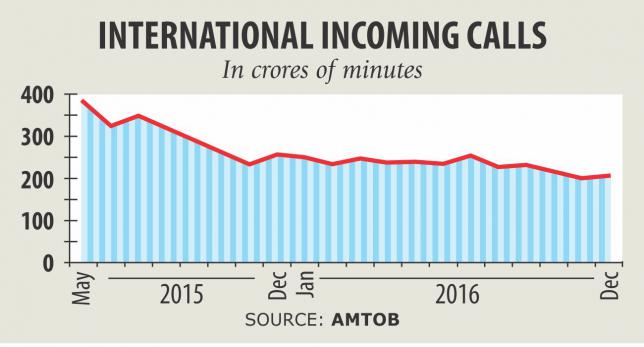The government’s earnings from incoming international telephone calls fell 23.41 percent year-on-year to Tk 1,201 crore in 2016 because of a sharp decline in inbound voice traffic and a rise in the call routing rate.
Shahjahan Mahmood, chairman of Bangladesh Telecommunication Regula-tory Commission (BTRC), said the regulator is trying to fix the issue by way of enacting regulation.
“We have formed a committee, which is working on the subject.”
The government earned Tk 1,568 crore in 2015 from incoming international calls.
In 2013-14, the government’s earnings from international incoming calls stood at Tk 1,851 crore, although the daily call volume was less than half then.
At that time, the call termination rate was 3 cents a minute, 51.75 percent of which went to the state coffer; the government reduced the floor rate to 1.5 cents in early 2015 and its share to 40 percent.
The telecom regulator found that the international incoming call minutes declined 46 percent within a span of 20 months. Total incoming voice calls stood at 383.2 crore minutes in May 2015, but it dropped to 205.7 crore minutes at the end of December 2016.
The international gateway operators (IGWs) formed a platform called IGW Operators Forum (IOF) in early 2015. It raised the international incoming call rate by 33.33 percent to 2 cents a minute in August 2015.
But the IGW operators that route the incoming international calls have continued to share revenue with the government and other stakeholders based on the floor rate of 1.5 cents, said the Association of Mobile Telecom Operators of Bangladesh (AMTOB), in a letter to BTRC recently.
It said the government is being deprived of Tk 420 crore in revenue a year for the gap between the routing rate and the sharing rate.
Bangladesh is losing an additional Tk 1,368 crore in earnings a year due to the significant decrease in the international incoming calls.
Similarly, the mobile operators and interconnection exchanges faced Tk 932 crore in lost earnings, according to AMTOB.
The letter said incoming call volumes declined as a result of the hike in the call rate.
From August 2015 to July 2016, the IOF earned about Tk 1,200 crore in surplus that it has not shared with the stakeholders, said AMTOB.
“As a result, all the stakeholders witnessed a fall in revenue growth, whereas the earnings of the IGWs went up significantly,” said the letter signed by AMTOB Secretary General TIM Nurul Kabir.
The AMTOB recommended the government re-fix the incoming call routing rate or ask IOF to share the additional revenue, if the forum wants to maintain the current rate.
The letter also said the IOF raised the international incoming call rate without any approval from the government or the telecom regulator. However, the IOF said there is no link between the increase in the call routing rate and the decrease in the incoming call volume.
“To generate revenue, the BTRC needs to take action against illegal calls, as it has increased hugely. Mobile applications such as Whatsapp and Viber are also contributing to the decline,” said Muzharul Haque, deputy chief executive of the IOF.
Haque said the IOF members paid Tk 1,100 crore in dues in the last one year and a half to the government and another Tk 300 crore to other stakeholders.
The government’s earnings from the sector would have declined further had the incoming call rate not been increased, he added. “To maintain the steady earnings seen in the past, the government should increase the incoming call rate to 3 cents.”
The IOF is a platform of seven IGW operators but there are 23 IGWs operating in Bangladesh.
The BTRC chief said they are sitting with the stakeholders to finalise recommendations on the issue, which will be placed before the prime minister.
Recently, the BTRC received an order from the Prime Minister’s Office to re-fix the incoming call rate. It has started talks with various stakeholders.
Source: The Daily Star

